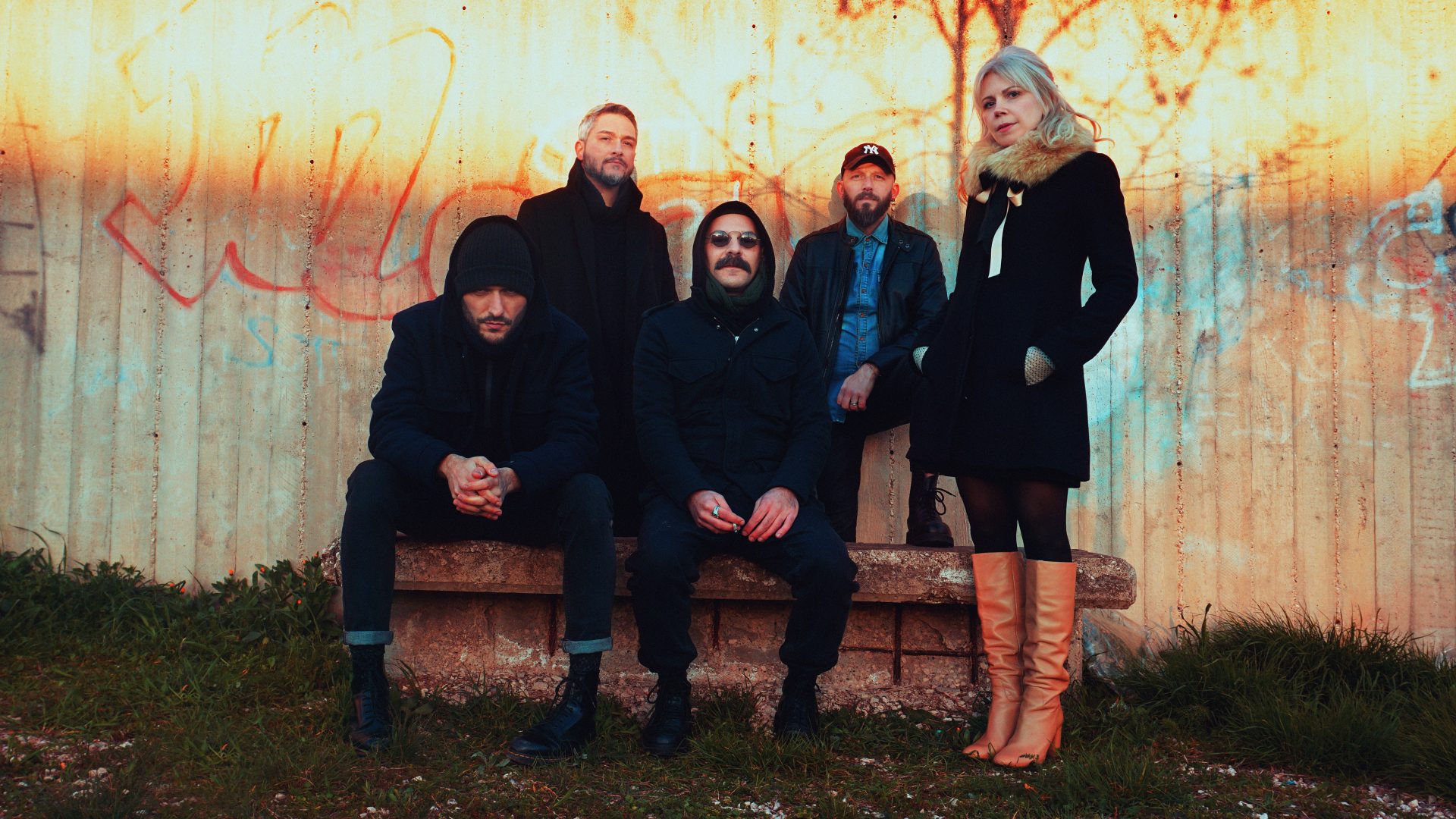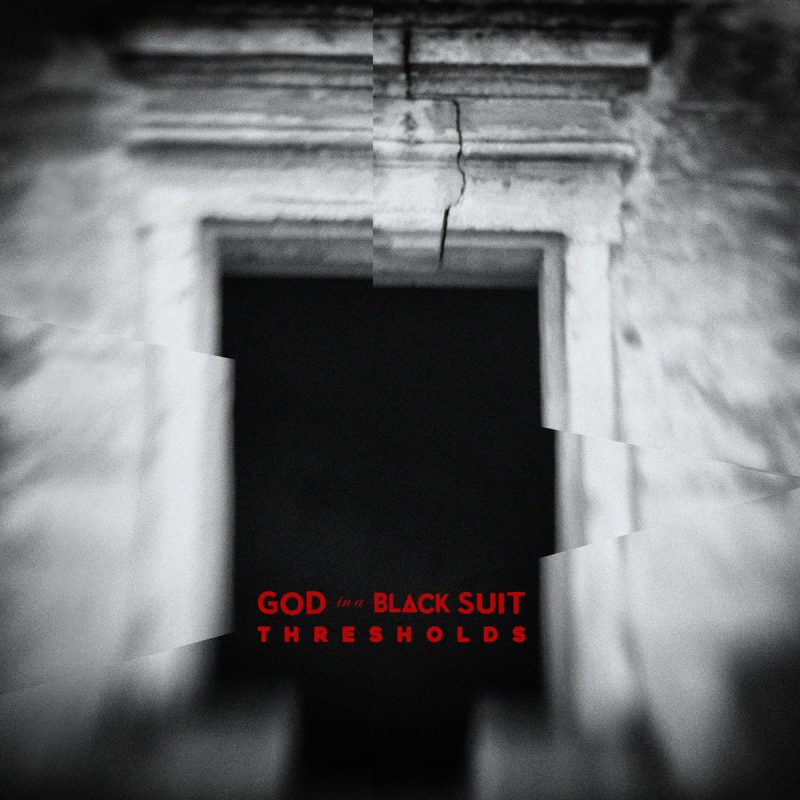On their second full-length, Thresholds, Italy’s God in a Black Suit veers dramatically away from comfortable territories, plunging headfirst into the visceral currents of emotional change. Early in 2020, from Matera emerged a quintet: Annalisa Laterza’s bass murmuring beneath Bruno Pantone’s shimmering guitar, drummer Gianluca Natrella driving rhythms, vocalist Matteo Demma’s raw, resonant voice, and Pietro De Ruggieri’s spectral synths shaping new forms. God in a Black Suit draws out a quiet intensity, balancing restraint with resonance. Their music shifts between light and murk, inviting listeners into a space that’s immersive, layered, and unafraid to linger in the in-between. There’s a tension here—measured, deliberate—that pulls without pushing, urging surrender without demand.
Thresholds opens boldly with its title track, an exploration of uncertainty and transformation. Here, life’s continual shifts act as portals to personal growth, urging courage despite the darkness ahead. Each conclusion births fresh beginnings, a cyclical celebration of resilience and rebirth, coaxing listeners to step bravely into the unknown, however intimidating the horizon might seem. Psychedelic guitars entwine with whispered vocals.
A New Life kicks down the door with a defiant stomp, ditching conformity for chaos and clarity. God in a Black Suit turn the volume up on personal revolution; an adrenaline rush of liberation that spits on the ordinary and sets fire to polite expectations. Guitars lash and loop with frayed abandon, savage and soaring in equal measure, while Matteo Demma’s vocals shift between silk and scream…caressing one moment, careening the next. The rhythm section tears through the track like it’s trying to outrun its own pulse. Think Bauhaus channeling Pixies at their most unhinged, with a side-eye to Dead Kennedys’ seething snarl. A manifesto in motion, breathless and bold.
To Forget dials down the rage and lets the ache breathe. Matteo Demma’s voice trails through ghost-scented memories and half-heard promises, collapsing into the soft chaos of loss. There’s a brittle beauty here, a lacerated tenderness that balances restraint and rupture. Jangled guitars snap with the angular tension of Gang of Four, while the swirling melancholy of The Chameleons and the stark pulse of early Wire creep through the mix. It’s a eulogy for emotional architecture: fragile, fractured, and still standing, somehow.
I Remember You unspools like a solitary reel of lost footage: grainy, grey-toned, and dusted with the ache of memory. Matteo Demma’s vocal delivery channels the wounded clarity of Joy Division’s most lonesome moments, while the synths and guitars shimmer in lockstep with Covenant’s emotional precision. There’s a stoic sadness beneath the surface, as if the track itself is pacing the perimeter of a life once lived. The silence between lines feels like a room emptied too soon, each note a soft collision with what’s no longer there.
Dirt grinds forward with menace, dragging a chain of bitter truths behind it. Built on a sinister, slow-motion bassline and methodical percussion, the song takes aim at hypocrisy and self-deception, offering no redemption…only reflection through shattered glass. There’s no flinching here. Demma’s vocals sneer and accuse with brutal economy, holding up a mirror to decay both internal and interpersonal. Think early Killing Joke slowed to a crawl, or Christian Death in a brooding, interrogative mood.
One More Time walks barefoot across broken glass. The track aches with longing, steeped in a desperate wish to rewind, to reclaim a version of the self that hasn’t yet been disfigured by loss. The arrangement is sparse but weighty…guitar lines drift like torn photographs, percussion pacing like a pulse trying to slow itself. Matteo Demma’s delivery is cracked and tender, letting the silence speak louder than the lyrics. Childhood joy flickers at the edges, but the center remains cold, asking again and again for time that won’t return.
Sunshine strips away the surface gloss of everyday life to expose a raw sense of disconnection. The lyrics point to a world full of noise and faces, but no real contact. Demma voices the frustration of being surrounded yet unseen, walking among people who look through you. It’s a track about emotional absence in a hyperactive world: catchy, clear, and brutally honest.
Whisper is a quiet song about regret and lost time. Dedicated to maternal bonds, it deals with distance—emotional and temporal—and the pain of not understanding until it’s too late. The arrangement is sparse, allowing each word to land with weight. There’s no sentimentality here, just clear sorrow and the wish for a second chance.
Invisible is a blunt expression of detachment and fatigue. Matteo Demma writes with clarity about the desire to withdraw, to watch the world without engaging. The song deals with emotional numbness, disillusionment, and disappointment, backed by a slow, heavy rhythm that mirrors the drag of routine and the dull pressure of existing among people without connection.
Celebrating the transformative power of intimacy, Together highlights the deep, sometimes tumultuous connection between lovers. Embracing vulnerability and emotional liberation, the lyrics illustrate how love can simultaneously cage and free individuals. It underscores the willingness to lose oneself entirely within another, revealing love as both refuge and liberation.
Goodbye is direct, raw, and unafraid. The song deals with paralysis in the face of finality, asking hard questions and offering no easy answers. It’s about confronting the urge to disappear and turning that impulse into action or clarity. The tension builds through repetition, making space for honesty in uncomfortable places.
Breath shifts toward clarity and calm. Stripped of excess, it leans into quiet affirmations: night, stillness, and emotional reset. The message is simple—start again, seek peace, reject clutter. The tone is measured and sincere, encouraging movement away from fear and toward connection, self-respect, and emotional openness.
End closes the album with quiet intensity. There’s no drama; just acceptance, and the weight of parting words. It’s about closure through presence, not detachment. The lyrics speak to mutual understanding in the face of endings, recognizing the emotional residue left behind without turning away from it. The farewell lands softly, but firmly.
Listen to Thresholds below and order the album here.
Following the acclaim of their debut Nails EP, God in a Black Suit push further into indie rock, darkwave, and post-punk. Thresholds, recorded at Sync Recording Studio in Matera, sees the quintet expanding their range: embracing heavier tones, sharper contrasts, and deeper emotional textures.
Follow God In A Black Suit:
















 Or via:
Or via: